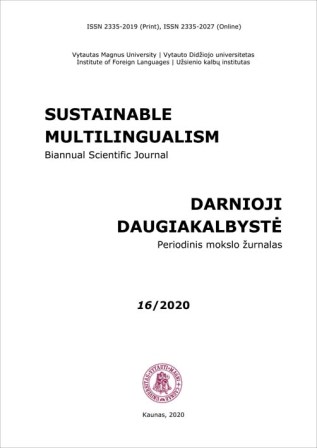Kalbų ir kultūrų vaidmuo imigrantų ir vietinių bendruomenių integracijos procese
The role of languages and cultures in the integration process of migrant and local communities
Author(s): Daiva Pundziuvienė, Jurgita Cvilikaitė-Mačiulskienė, Jūratė Matulionienė, Smiltė MatulionytėSubject(s): Anthropology, Language and Literature Studies, Psychology, Health and medicine and law, Migration Studies, Asylum, Refugees, Migration as Policy-fields
Published by: Vytauto Didžiojo Universitetas
Keywords: migrant and host communities; local integration of migrants; linguistic and cultural diversity; language and culture courses; intercultural communication; acculturation; acculturation strategies; mode
Summary/Abstract: There is no denying that fact that migration is a sensitive economic, political and social issue, which European institutions together with researchers and policy makers have been working on trying to create the cohesion between migrant and host communities. It has been widely recognized that attitudes towards migrants tend to be more positive when migrants have an opportunity to reveal their linguistic and cultural diversity to non-migrants. Researchers claim that local governments and municipalities “must be part of a framework of multi-level governance” for migrants’ integration (OECD, 2017). The 2030 Agenda for Sustainable Development highly recognizes the positive contribution of migrants, who deserve to live in a “just, equitable, tolerant, open and socially inclusive world” (2030 Agenda, 2015). Existing research has acknowledged that migrants make low use of local services, such as police, hospitals, educational institutions or leisure facilities due to language barriers and uncertainty on rules of engagement (Sime & Fox, 2014), cultural barriers and issues of trust in services (Alpers, 2016) or social exclusion (Arai, 2006). In order to develop insight into the realities of integration and social cohesion between migrant and host communities in Great Britain, in 2019 this study used a survey to explore how trust and meaningful interaction between all sections of the community could be created by providing social and educational activities for migrant and host communities in Boston, the UK. Furthermore, the research aimed to answer the question whether learning about another culture could increase understanding of how one’s own culture shapes the perceptions of oneself, of the world and of our relationship with others.[...]
Journal: Darnioji daugiakalbystė
- Issue Year: 2020
- Issue No: 16
- Page Range: 112-130
- Page Count: 19
- Language: Lithuanian

